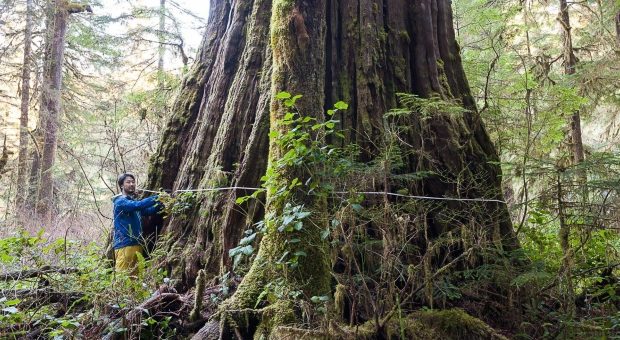Reinvesting in British Columbia’s Forest Sector
Despite today’s announcement that $150 million will be invested in reforestation, a wave of unemployment is sweeping across rural B.C. because of government policies that have devastated the province’s once-great forest resource.
Premier Christy Clark now says the appropriate response is to put forest industry people to work building roads and bridges. B.C. really needs a bigger vision than that – especially since the provincial government is complicit in the sector’s mismanagement in the first place.
In the late 1990’s and early 2000’s, a pine beetle infestation erupted. The pandemic was exacerbated by successive B.C. NDP and Liberal governments who pursued policies that created largely monoculture forests. Pine trees grow fast and the government encouraged their use as the “preferred” species for replanting huge swaths of land that had been clear-cut. At the same time, the government’s shortsighted forest fire suppression policies snuffed out fires that would have naturally created a more diversified landscape. (Forest fires play a vital ecological role and, where possible, should be monitored closely but left to safely burn.)
The result: huge plantations of pine trees flourished. As climate change reduced the severity of B.C. winters, they became perfect breeding grounds for pine beetles and the largest beetle attack ever seen in North America was unleashed destroying millions of trees over a massive area. As the epidemic spread, and the health of B.C.’s forests deteriorated, the government was forced to dramatically increasing the allowable cut.
In recent years, the decline of the province’s forests has been masked by the increased cutting of dead trees in so-called salvage logging – but there is no hiding the fact that nearly 60% of the merchantable pine has been destroyed by the beetle invasion. Today, even the dead trees are running out and across rural B.C. forest industry jobs have entered a period of rapid, devastating decline.
Recent labor force statistics show that while the number of jobs in Metro Vancouver are up, there has been a drop in rural B.C. The unemployment rate in Mainland/Southwest B.C. is at 5%, but it is 8.2% in Thompson-Okanagan and 10.5% in North Coast/Nechako. In December, Tolko Industries shut down its Nicola Valley sawmill, taking 203 high-paying jobs out of a small community that will struggle without them.
And that’s just the start of it.
Because of the declining timber supply, the province’s chief forester has been forced to reduce the allowable annual cut (AAC). In Prince George, the AAC is being reduced by 50%. In Quesnel the AAC is dropping to 1.6 million cubic metres from 4 million cubic metres. Last March, in the Merritt Timber Supply Area, the AAC was cut to 1.5 million from 2.4 million cubic metres.
If you reduce the number of trees being cut, there will be a corresponding drop in the number of loggers, truck drivers and mill workers who have jobs. The Truck Loggers Association recently heard at its annual convention that five or six pulp and paper mills will close in the next two to six years. Thousands of jobs will be lost.
Over the past 25 years, NDP and Liberal governments’ have tried to position themselves as defenders of the forest industry, by setting the AAC at unsustainable levels, instead of concentrating on value added and diversification. The consequences of this are now coming home to roost. Premier Clark’s plan to increase spending on infrastructure projects to address the economic divide between rural and urban B.C. may deliver much needed infrastructure but will not create a long term solution.
What rural B.C. really needs are healthy forests and a vibrant small/medium family business culture that can provide sustainable logging, support local economies and provide environmental diversity over the long term. That’s how communities grow and prosper.
We need to rethink our forest management in the context of the realities of the 21st century – global warming; technological change; international competition; not to mention the immediate issues of growing protectionism, and the soft wood lumber dispute. Our tenure structures date back to the 19th century, and our mills have been starved of investment over recent years. The investment that has taken place, has usually replaced people with machines.
Rather than manage our forests, the BC Liberals have toyed with privatizing them. It is worth remembering that in 2001, Mike De Jong, then Minister of Forests, told a meeting of silviculturalists that BC’s Crown forests would be “unrecognizable” when he and the Liberals were finished with them.
Our forests are our collective asset, and we need to ensure that first and foremost, British Columbians are fully benefiting from them, not just corporations and vested interests.
We need to start a new conversation about our forests. We need to ask:
- How do we maximize the benefits of our forest industry?
- How do we get the greatest value from our fibre?
- How do we ensure that our rural and remote communities are included in the benefits?
- What is the most effective long term management structure?
- How do we integrate indigenous people and communities in decision making?
- How are we going to manage sustainability, long term productivity, mitigating climate change and enhancing secondary manufacturing?
A redesign of our forest management is long overdue and would be priority of a BC Green Government. We need to truly end the war in the woods, and ensure that our forests work for all of us.
Comments are closed.




